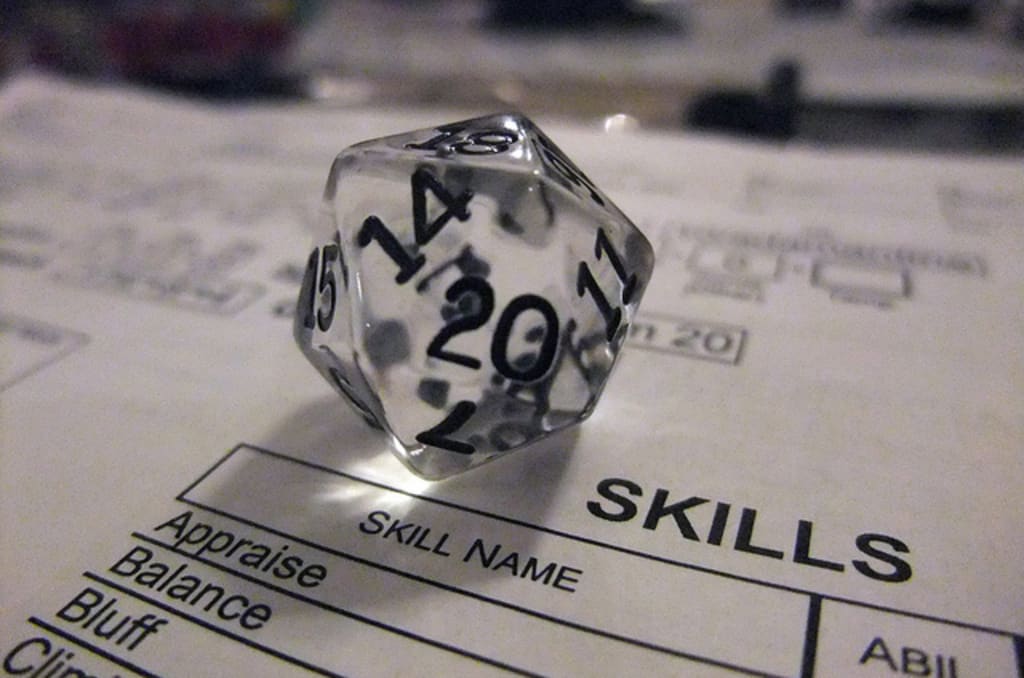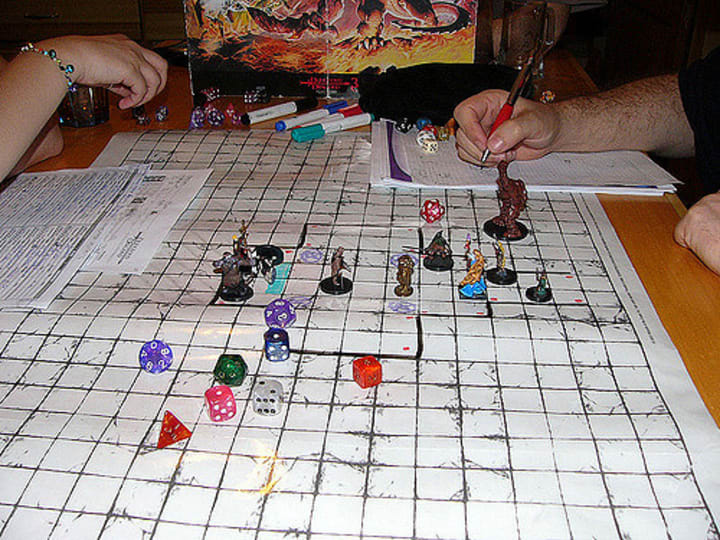Dungeons & Dragons & Depression
Escaping the real world one ability check at a time.

"I reject your reality and substitute my own."- Adam Savage
Reality, in its collective, is horrifying. I came to this conclusion a few years ago when my own battles with depression increased in intensity. On the small scale, I was struggling to deal with my own day to day life. Paying bills, rent, working, socializing, and being creative seemed like trudging through thick tar with no end in sight. Large scale problems like civil rights, war, poverty, and the laughingstock that is our political system seemed like insurmountable problems, but I worried about them all the same. It seemed this world was just not worth living in anymore.
One of my escapes from the burden of reality was video games. They allowed me to live in alternate worlds where I dictated the pace and action of the universe instead of having the universe act upon me. Naturally, I ended up finding a website called Twitch, where people entertained audiences while playing video games. I was immediately hooked.
However, it wasn't someone playing a video game that really turned my life around. I had been a fan of Dodger, a popular gaming YouTuber, and she had announced that she was going to be on a show called The West Marches on Twitch. The West Marches was a show hosted by JP McDaniel, a popular Twitch streamer, where people played Dungeons & Dragons. I knew of D&D but had never played it, or even watched people play it before. Being a fan of Dodger, I decided to tune in.
I got hooked immediately. It became a new addiction. I started consuming all of the D&D content JP's channel offered. I watched old episodes of his old shows on YouTube. I couldn't get enough. It was around this time that I discovered one of my favorite YouTube channels, Geek & Sundry, had their own D&D show on their Twitch stream. I decided to give it a shot despite not really knowing anyone on the cast. That show was called Critical Role. My life has not been the same since.
After Critical Role, I discovered Acquisitions, Inc., held by the Penny Arcade guys. Then I found Maze Arcana by Satine Phoenix and Ruty Rutenberg, followed by the Waffle Crew of Dice, Camera, Action! I could not stop watching D&D shows. It became my new addiction.
This, of course, led me to seek out others in the real world that played D&D. After finding a group of lads to play with, I enjoyed my first real D&D group. It was something I looked forward to, even though we didn't play as often as we would've liked.
Inserting My Own Reality

Photo by Ryan Melaugh, used under Creative Commons Attribution, via Flickr
It took me a while after basking in the thrill of D&D to sit back and think about why I loved it so much. The answer was very easy to come to. D&D allowed me to immerse myself in a world where my actions directly affected my and my group's world in a way that video games didn't allow. Granted, I was playing a character, but in essence, I was the character. There was no animated avatar on a screen that I controlled. I made the decisions and then actively participated in their execution. I never had to press a button combination or aim precisely. I just had to roll a die.
The level of immersion allowed me to escape from my depression and embody a character that wasn't bogged down by the darkness. I could act in ways I wish I could act in the real world to solve in-game problems. This gave me the satisfaction that I facilitated real, positive change. Even failures seemed fine, as I could turn them into interesting or funny story moments.
Of course, while playing the game I would feel amazing. I would kill an orc, solve a puzzle, rescue a hurt person, or aid my fellow adventurers and I would get a rush of dopamine that usually lasted a few days. But then the darkness and pain of actual reality would set back in, and I would yearn to play again.
D&D Can Be Addicting

Photo by Thomas Roche, used under Creative Commons Attribution, via Flickr
D&D isn't a bad addiction to have, in a way. It won't harm you like drugs or alcohol would, it encourages you to socialize and get to know new people, you learn how to tell stories, and it helps with problem solving. There are pitfalls, though. Materials to play the game can be expensive, and if you are someone who gets a high from buying things, there are plenty of accessories you can spend money on that might be better spent in other ways.
The worst thing that could happen is that if you don't have a way to play, it can lead you to fall deeper into depression. Watching others play it can alleviate some of this, but there is nothing really like actually playing. Your brain knows that and it will continue to crave that interaction until you finally put minis on a map and roll some dice.
I think about D&D a lot. More than I probably should. My lack of being able to play is only adding to the current bout of depression I'm facing. Due to moving soon, I had to say goodbye to my first D&D group. It was one of the hardest things I've had to do. Strangely, it was like having to break up with a significant other. My heart ached for a week after.
Until I can find a regular game where I'm moving to, I will continue to watch D&D shows, interact with all the fans on social media, and marvel at the wonderful fan art that is generated every day. I wish I had discovered D&D sooner. It makes me feel like there is actually something worth staying on this planet for. If I could, I would substitute my D&D reality for this one, but for now I will continue to deal with the real world and look forward to the next time I get to cleave a Bugbear in half.
About the Creator
Sean Fraser
Aimless polymath who knows a little bit about a lot of things. D&D/Sports nerd hybrid. Fan of the NFL's Buffalo Bills, League One's AFC Wimbledon, Critical Role, Dice, Camera, Action!, and Acquisitions, Inc. C Team. And chicken wings.






Comments
There are no comments for this story
Be the first to respond and start the conversation.